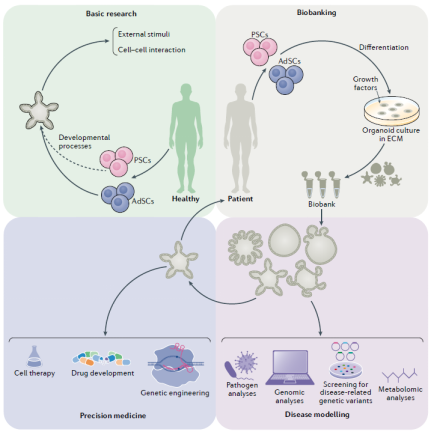

类器官研究平台
类器官(organoid)是将具有干性的细胞进行三维培养形成的与其来源组织在结构和功能上高度相似的微型组织,具有自我组织和自我更新的能力。根据其来源细胞的不同,类器官可分为正常成体干细胞来源(adult stem cells, AdSCs)类器官、多能干细胞(pluripotent stem cells, PSCs)来源类器官以及肿瘤类器官。
作为一种新型的研究模型,类器官既可以在体外传代培养,又能够维持其来源组织的异质性和空间特征,在疾病建模和个体化精准治疗中发挥着重要的作用。
目前,该平台已建立了多种临床肿瘤组织来源的类器官培养体系以及正常组织来源的类器官培养体系,包括尿路上皮癌类器官培养体系及正常尿路上皮类器官培养体系、肺腺癌类器官培养体系及正常肺类器官培养体系、肾癌类器官培养体系及正常肾类器官培养体系、结直肠癌类器官培养体系、甲状腺癌类器官培养体系、鼻咽癌类器官培养体系等。
建立的肿瘤类器官经多组学鉴定后,建库冻存。作为肿瘤病人体外的“替身”,肿瘤类器官可以预测病人对抗肿瘤药物的反应,为临床个体化治疗提供实验及理论依据。联合单细胞测序技术及基因编辑技术可以探究肿瘤发生发展以及耐药的分子机制。

图1. 类器官模型的应用。
1. Lancaster, M.A. and J.A. Knoblich, Organogenesis in a dish: modeling development and disease using organoid technologies. Science, 2014. 345(6194): p. 1247125.
2. Li, M. and J.C. Izpisua Belmonte, Organoids - Preclinical Models of Human Disease. Reply. N Engl J Med, 2019. 380(20): p. 1982.
3. Li, Z., et al., Patient-Derived Upper Tract Urothelial Carcinoma Organoids as a Platform for Drug Screening. Advanced Science, 2021.(accepted)
4. Yu, L., et al., Patient-derived organoids of bladder cancer recapitulate antigen expression profiles and serve as a personal evaluation model for CAR-T cells in vitro. Clin Transl Immunology, 2021. 10(2): p. e1248.
5. Li, Z., et al., Human Lung Adenocarcinoma-Derived Organoid Models for Drug Screening. iScience, 2020. 23(8): p. 101411.
6. Li, Z., et al., Protocol for generation of lung adenocarcinoma organoids from clinical samples. STAR Protocols, 2021. 2: p. 100239.
7. Chen, D., et al., Organoid cultures derived from patients with papillary thyroid cancer. J Clin Endocrinol Metab, 2021.
8. Kim, J., B.-K. Koo, and J.A. Knoblich, Human organoids: model systems for human biology and medicine. Nature Reviews Molecular Cell Biology, 2020. 21(10): p. 571-584.